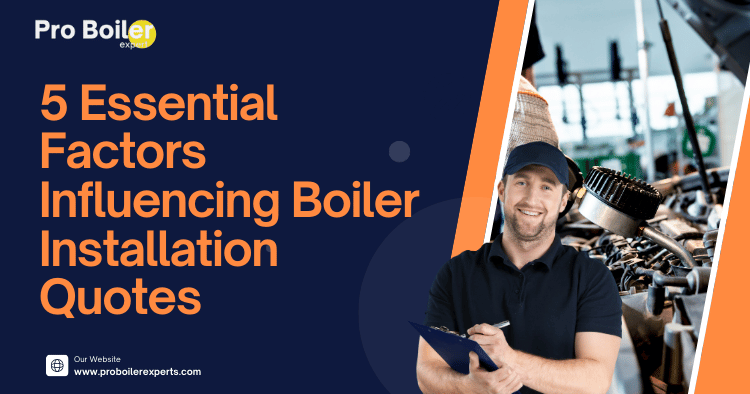Table of Contents
- Introduction
- 1. Type of Boiler
- 2. Installation Complexity
- 3. Location of Installation
- 4. Additional Features and Requirements
- 5. Energy Efficiency Ratings
- Conclusion
- FAQs
Introduction
When it comes to keeping your home warm and cozy, a boiler is an essential element. However, installing a new boiler can be a substantial investment, and understanding what influences the quotes you receive is crucial. In this article, we will delve into the five key factors that can affect boiler installation quotes, helping you make informed decisions and budget effectively for this important home improvement.
1. Type of Boiler
The type of boiler you choose significantly impacts the installation quote. There are several types of boilers available:
- Combi Boilers: These are compact units that provide heating and hot water on demand, making them ideal for smaller homes. Installation costs for combi boilers can be lower compared to other types due to their straightforward installation process. For more details on the benefits of combi boilers, check out the top 5 benefits of choosing combi boilers for your home.
- System Boilers: Suitable for larger homes, system boilers can supply hot water to multiple taps simultaneously. Installation costs may increase due to the need for additional components like a hot water cylinder. Explore the benefits of system boilers in this article.
- Regular Boilers: Also known as conventional or traditional boilers, these require a separate hot water cylinder and a cold water tank. Installation can be more complex, leading to higher costs. For further insights, read about the benefits of conventional boilers here.
“Choosing the right boiler type not only impacts your initial costs but can also influence your long-term energy efficiency and comfort.”
| Boiler Type | Average Cost Range | Installation Complexity |
|---|---|---|
| Combi | $3,000 – $5,000 | Low |
| System | $4,000 – $6,500 | Medium |
| Regular | $3,500 – $7,000 | High |
2. Installation Complexity
The complexity of the installation can vary widely based on several factors:
- Existing Infrastructure: If your home already has a boiler system in place, the installation may be easier and cheaper. Conversely, replacing an old system with a different type may require more extensive modifications.
- Pipework Requirements: The condition and layout of your existing plumbing can also affect costs. New pipe installations or modifications can add to the overall expense.
- Access and Space: If the installation area is difficult to access or requires extensive work, this will increase labor costs. For common installation issues and solutions, refer to this guide.
“Complex installations often lead to unexpected costs, so it’s wise to account for potential hurdles in your budget.”
3. Location of Installation
Your geographical location plays a significant role in determining installation costs. Here are some location-based factors to consider:
- Regional Labor Costs: Labor rates can vary significantly based on location. Urban areas generally have higher rates compared to rural regions.
- Local Regulations: Different regions have varying building codes and regulations. Stricter codes may necessitate additional work to ensure compliance.
- Weather Considerations: In colder climates, homeowners may require more robust heating systems, affecting the type of boiler needed and subsequently the installation quote.
“Understanding your local market can help you anticipate costs and find the right professionals for the job.”
4. Additional Features and Requirements
When requesting quotes, consider any additional features or requirements that could influence costs:
- Smart Thermostats: Integrating smart technology for better energy management can enhance comfort but may increase installation costs. Explore the latest innovations in smart boilers in this article.
- Flue Systems: Depending on your boiler type, the flue system may need to be updated or replaced, impacting the overall quote.
- Water Treatment Systems: If your area has hard water, installing a water softener or treatment system can prolong your boiler’s life, adding to the costs.
“Consider potential upgrades during the planning phase to avoid surprises and maximize efficiency.”
5. Energy Efficiency Ratings
Energy efficiency is a critical factor in today’s boiler market. Boilers are rated on their energy efficiency, and choosing a more efficient model can affect your installation quote:
- Higher Efficiency Ratings: Boilers with higher efficiency ratings often come with a higher upfront cost. However, they can save you money on energy bills over time. You can learn more about high-efficiency boilers here.
- Incentives and Rebates: Many regions offer incentives for installing energy-efficient boilers, which can help offset the higher initial costs. Research local programs to see if you qualify.
| Efficiency Rating | Average Cost Increase | Potential Savings |
|---|---|---|
| 80%-90% | $500 – $1,500 | $200/year |
| 90%-100% | $1,000 – $2,500 | $300/year |
“Investing in energy efficiency not only reduces your carbon footprint but also pays off in the long run through lower utility bills.”
Conclusion
Understanding the factors that influence boiler installation quotes can help you make informed decisions and avoid unexpected costs. By considering the type of boiler, installation complexity, location, additional features, and energy efficiency ratings, you can better prepare for your investment in home heating.
FAQs
1. How can I get the best boiler installation quote?
To get the best quote, compare estimates from multiple contractors, ensuring they include the same scope of work and materials.
2. What is the average lifespan of a boiler?
Most boilers have a lifespan of 10 to 15 years, depending on usage and maintenance.
3. Is it worth investing in an energy-efficient boiler?
Yes, while the initial cost may be higher, energy-efficient boilers can save you money on energy bills over time, making them a wise investment.
4. Do I need a permit for boiler installation?
In many areas, a permit is required for boiler installation. Check with your local building authority to ensure compliance.
5. Can I install a boiler myself?
It’s not advisable. Boiler installation requires specialized knowledge and skills to ensure safety and compliance with local regulations. Always hire a qualified professional.
By understanding these essential factors, you can navigate the process of boiler installation with confidence and ensure your home stays warm and cozy for years to come! For additional insights on boiler types and their benefits, explore our comprehensive resources on various boiler systems available here.




